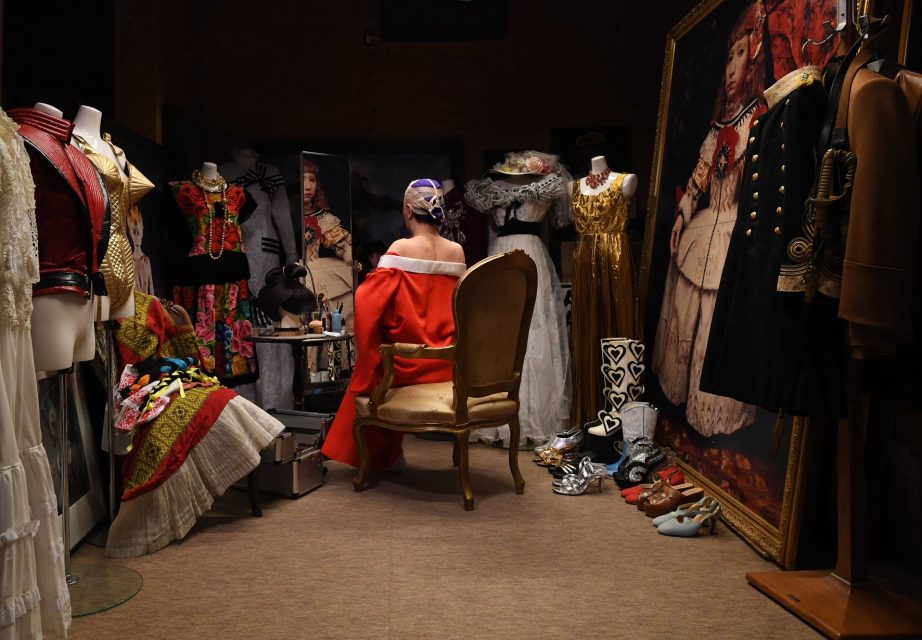January 25 (Saturday) – June 7 (Sunday), 2020

Yasumasa Morimura has been acclaimed for his self-portraits in which he re-enacts famous paintings, movies and moments in history. By incarnating himself through the skillful use of makeup and costume, he transcends the time, race and gender of the subject to imbue it with a meta-commentary uniquely his own.
His video work entitled Ego Obscura, together with a lecture performance written and performed by Morimura himself, comprises the centerpieces of an exhibition in which the artist references Japan’s modern history and world culture.
Morimura was born in Osaka in 1951 during the post-war occupation by the Allied Forces and educated at a time when the country’s pre-war teachings had been rejected and the resulting “void” infiltrated by Western values. This experience led him to see truth, values and ideas as things that “reside outside the body,” which like clothes could be “freely changed” at will (quotes from Ego Obscura).
In the exhibition title Ego Obscura, Morimura uses an unfamiliar word to refer to what he describes as “an ambiguous ego wrapped in darkness.” He explores this ego through self-portraits imbued with complex feelings towards a motherland that go beyond mere affection, works that direct the question “what is the meaning of the “self”?” not only to us, but to the nation of Japan itself as well.
Screening Times for Ego Obscura (video work)
The video work Ego Obscura (duration: approx. 1 hour) will be screened in Gallery V (on the second floor) according to the following schedule. Each screening will be limited about 20 people (including standing-room-only viewers). To attend a screening, please pick up a ticket at the reception desk and go to Gallery V at least five minutes before the specified time. Entry will not be allowed after the start of the screening.
*Note: The 15:50 screening will take place in the Hall (on the first floor) on days when there is a lecture performance (January 26, February 22 and 23, March 20 and 21, April 12).
Screening Times (except Wednesdays)
11:30
12:35
13:40
14:45
15:50
Screening Times on Wednesdays
11:30
12:35
13:40
14:45
15:50
16:55
18:00
19:05
Highlights of the Exhibition
1. Ego Obscura, Tokyo 2020 Lecture Performance
Morimura will give a lecture performance of his work Ego Obscura, Tokyo 2020.
*Reservations for the performances are closed.
*Due to the danger of contagion presented by the novel coronavirus COVID-19, we regretfully must announce the cancellation of the lecture performances scheduled for March 20 (Friday), March 21 (Saturday) and April 12 (Sunday). We request your kind understanding.
Dates: January 25 (Sat.), 26 (Sun.), February 22 (Sat.), 23 (Sun.), March 20 (Friday/national holiday), 21 (Sat.), April 12 (Sun.)
Time: 16:00 – 17:00
*Performance will be held in Japanese only.
*Reservations required. Free with museum admission. Details will be posted on the museum website.
2. Yasumasa Morimura and the Hara Museum
Morimura’s previous exhibitions at the Hara Museum include Rembrandt’s Room (1994), which delves deeply into the “self” using as his theme the great 17th century painter from the Netherlands and the light and dark aspects of his life, and Morimura Self-Portraits: An Inner Dialogue with Frida Kahlo (2001), which presents the life, loves and death of the great 20th-century Mexican artist Frida Kahlo through festively rendered images. Another work, Rondo, is a unique permanent installation that Morimura made using one of the building’s toilets in 1994. While undergoing occasional changes in clothing, Rondo stands as one of the museum’s defining trademarks.
This spring, Hara Museum ARC will present Portraits: Selections from the Hara Museum Collection from March 14th, a show which will feature portraits by a variety of artists, including all 23 works in the Rembrandt series by Yasumasa Morimura.
3. Morimura to Juxtapose His Famous Early Work Portrait (Futago) born of Manet’s Olympia with His New Work Une moderne Olympia
Morimura’s famous Portrait (Futago) (1988) which he created early in his career, takes as its subject Edouard Manet’s Olympia (1865), a work that changed the course of modern painting. In it, Morimura, a person of the so-called “yellow race” and of the male gender, assumes the roles of both the white prostitute and black servant painted by Manet. Now, thirty years later, Morimura has unveiled his most recent work, Une moderne Olympia, in which the figure whose nakedness is exposed to the public gaze looks back with a gaze even more intense. Here, the young prostitute has been changed into a geisha reminiscent of Madame Butterfly and the black servant into a Western male reminiscent of Pinkerton. The exhibition features a new work by Morimura based on Manet’s other masterpiece made late in his career, A Bar at the Folies-Bergère. We invite you to view Morimura’s presentation of these various protagonists and the complex interaction that arises between them.
Yasumasa Morimura
Born in 1951 in Osaka where he currently resides, Morimura made his debut in 1985 with self-portraits based on his personal interpretation of Vincent Van Gogh and has continued to produce self-portraits on the theme of the “self.” He served as the artistic director of the Yokohama Triennale in 2014, and in 2018, opened the Morimura @ Museum in Kitakagaya, Osaka. His solo exhibitions in Japan and abroad include The Self-Portraits of YASUMASA MORIMURA: My Art, My Story, My Art History, National Museum of Art, Osaka, 2016; Yasumasa Morimura. The history of the self-portrait, The Pushkin State Museum of Fine Arts, Moscow, 2017 and Yasumasa Morimura: Ego Obscura, Japan Society, New York, 2018. He is the author of many books, the most recent being Jigazo no Yukue (the whereabouts of the self-portrait), Kobunsha Co., Ltd., 2019. He was awarded the Order of Purple Ribbon in 2011.
Title: Yasumasa Morimura: Ego Obscura, Tokyo 2020
Dates: January 25 (Saturday) – June 7 (Sunday), 2020
Organized by: Hara Museum of Contemporary Art
Supported by: regist ART
Cooperation provided by: Yoshiko Isshiki Office, Chishima Real Estate Co., Ltd., Japan Society, New York
Venue: 4-7-25 Kitashinagawa, Shinagawa-ku, Tokyo 140-0001 Tel: 03-3445-0651
E-mail: info@haramuseum.or.jp Website: https://www.haramuseum.or.jp
Hours: 11:00 am – 5:00 pm, Wednesdays until 8:00 pm (last entry 30 minutes before closing)
Closed: Mondays (except February 24), February 25, April 14 and May 7, 2020
Admission: General 1,100 yen; Students 700 yen (high school and university) or 500 yen (elementary and junior high); 550 yen for those over 70; Free for Hara Museum members and for students through high school every Saturday during the school term; 100 yen discount per person for groups of 20 or more
